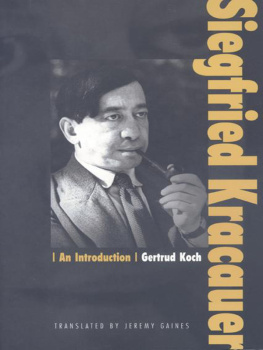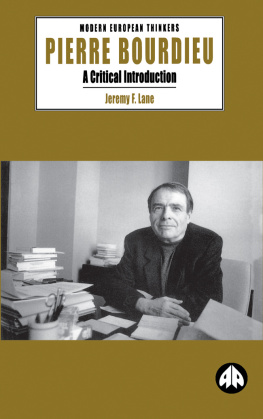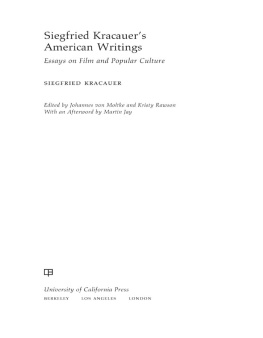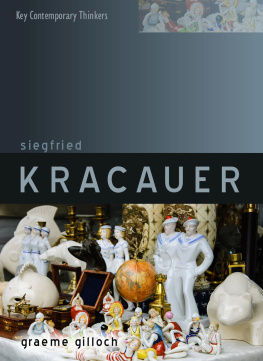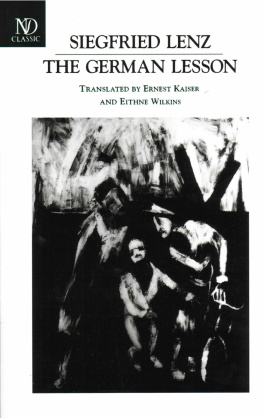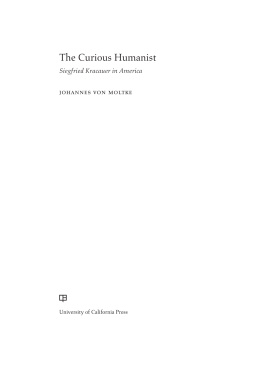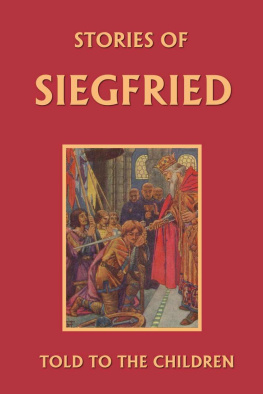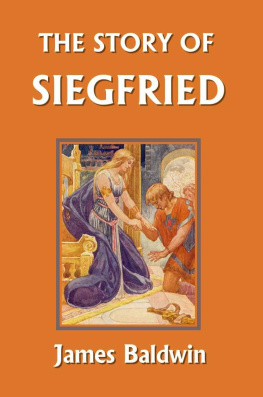Gaines Jeremy - Siegfried Kracauer: an introduction
Here you can read online Gaines Jeremy - Siegfried Kracauer: an introduction full text of the book (entire story) in english for free. Download pdf and epub, get meaning, cover and reviews about this ebook. City: Germany;Princeton;N.J, year: 2000;2014, publisher: Princeton University Press, genre: Detective and thriller. Description of the work, (preface) as well as reviews are available. Best literature library LitArk.com created for fans of good reading and offers a wide selection of genres:
Romance novel
Science fiction
Adventure
Detective
Science
History
Home and family
Prose
Art
Politics
Computer
Non-fiction
Religion
Business
Children
Humor
Choose a favorite category and find really read worthwhile books. Enjoy immersion in the world of imagination, feel the emotions of the characters or learn something new for yourself, make an fascinating discovery.
- Book:Siegfried Kracauer: an introduction
- Author:
- Publisher:Princeton University Press
- Genre:
- Year:2000;2014
- City:Germany;Princeton;N.J
- Rating:3 / 5
- Favourites:Add to favourites
- Your mark:
- 60
- 1
- 2
- 3
- 4
- 5
Siegfried Kracauer: an introduction: summary, description and annotation
We offer to read an annotation, description, summary or preface (depends on what the author of the book "Siegfried Kracauer: an introduction" wrote himself). If you haven't found the necessary information about the book — write in the comments, we will try to find it.
Siegfried Kracauer: an introduction — read online for free the complete book (whole text) full work
Below is the text of the book, divided by pages. System saving the place of the last page read, allows you to conveniently read the book "Siegfried Kracauer: an introduction" online for free, without having to search again every time where you left off. Put a bookmark, and you can go to the page where you finished reading at any time.
Font size:
Interval:
Bookmark:

Siegfried Kracauer
Siegfried Kracauer
AN INTRODUCTION
Gertrud Koch
Translated by Jeremy Gaines
PRINCETON UNIVERSITY PRESS
PRINCETON, NEW JERSEY
Copyright 2000 by Princeton University Press
Published by Princeton University Press, 41 William Street,
Princeton, New Jersey 08540
In the United Kingdom: Princeton University Press,
Chichester, West Sussex
All Rights Reserved
Library of Congress Cataloging-in-Publication Data
Koch, Gertrud, 1949
[Kracauer zur Einfhrung. English]
Siegfried Kracauer : an introduction / Gertrud Koch ;
translated by Jeremy Gaines.
p. cm.
Includes bibliographical references and index.
ISBN 0-691-01613-5 (cloth : alk. paper).
ISBN 0-691-04992-0 (pb : alk. paper)
1. Kracauer, Siegfried, 18891966Criticism and interpretation.
2. Motion pictures. 3. GermanyIntellectual life20th century.
I. Gaines, Jeremy. II. Title.
PT2621.R135 Z7613 2000
834.912dc21 99-089189
This book has been composed in Bitstream Caledonia
Originally published as Kracauer zur Einfhrung Junius Verlag, 1996.
The paper used in this publication meets the minimum requirements of ANSI/NISO Z39.48-1992 (R1997) (Permanence of Paper)
www.pup.princeton.edu
Printed in the United States of America
1 2 3 4 5 6 7 8 9 10
1 2 3 4 5 6 7 8 9 10
(pbk.)
Contents
CHAPTER 1 |
CHAPTER 2 |
CHAPTER 3 |
CHAPTER 4 |
CHAPTER 5 |
CHAPTER 6 |
CHAPTER 7 |
Preface
USUALLY, introductions are written about those authors (and works) who have been so widely discussed that a summarizing overview of the various interpretations of his or her work appears desirable. It would therefore seem high time to introduce readers to Siegfried Kracauer the author. Having said this, it is still too early to write an introduction. This book can only claim to be a provisional attempt. Although the collected edition of his works is not yet complete, his estate, housed in the Marbach Literary Archive near Stuttgart, is well cataloged, and on both sides of the Atlantic there have been significant attempts to bring Kracauer out from behind the shadows cast by his friends of the Frankfurt School.
About a decade ago I held a seminar where I presented texts by Kracauer and I later mentioned the course to Leo Lowenthal, a close friend of his. Lowenthal, who was at the time besieged by scholars writing histories of the Frankfurt School, was somewhat astonished. He had hardly imagined that his friend Friedel would suddenly emerge as a big name on the academic scene. Years later it was he who opened one of the very first conferences devoted to Kracauer, held at Columbia University. Yet the distance with which the friends of his youth in Frankfurt eventually treated Kracauers work was still evident in Lowenthals response. With the benefit of hindsight, distances can shrink into differences within a common overall project. The room that Kracauer has been allocated in the Frankfurt School is sparse. There are, however, other reasons, too, why I am not quite clear whether Kracauer was ever really at home in it or whether in some phases of his life he would not have liked to take his seat there. Kracauers notion of exterritoriality can perhaps magically be brought to bear here; yet he did not have much more or much less luck than others associated with the Frankfurt School. The extent to which he distanced himself from it can be gleaned from his own writings. The historians and philologists will do their part in measuring what joint space these thinkers occupied and will then be able to reassess it, invoking the inheritance of the Frankfurt School in his name, too.
I by no means wish to take part in this Brechtian Caucasian Circle into which Kracauer has been dragged, like Benjamin before him. To my mind, not only the zeal of battling critics, but also the contents of his works are responsible for such a circle having been chalked around him. With all due respect, his oeuvre is not borne by some systematic philosophical construction, but instead lives from many, often highly contradictory motifs. They are mainly held together by one thing: his name. And I mean this quite literally. Kracauers texts, his philosophical treatises, his essays, reviews, and glosses are all linked by a literary style that weaves them into one infinite, simultaneous fabric. Their precise literary character allows us, indeed compels us, to interpret them by studying the rhetoric of the metaphors rather than the structure of the concepts.
Introductions tend to presume that the primary texts of an author form a canonical body and then reconstruct them in as elegant a manner as possible. In the case of the present book, I have inverted this strategy. I am interested more in revealing Kracauers qualities through the texts themselves and their specific literary substance. For this reason, I wish to nurture the same enthusiasm for his novels as exists for those pieces of his extensive oeuvre that are already canonized, namely his analyses of film, his history of film, and his theory of film. These already have a firm place in film studies, even if they are often completely misunderstood or sharply rejected.
Time Line of Kracauers Life
1889 | Born on 8 February in Frankfurt, the only child of Rosette and Adolf Kracauer. |
1898 | Enters high school at the Philanthropin, Frankfurt. |
1904 | Moves to the Klinger Upper High. |
1907 | Graduates; in August, his first article for the arts section of Frankfurter Zeitung appears. The same year he starts studying architecture at the nearby Polytechnic in Darmstadt. |
19089 | Continues his studies at the Berlin Polytechnic and graduates from the Munich Polytechnic. |
1911 | Works in an architects office; travels, writes literary pieces, prepares his Ph.D. thesis, Die Entwicklung der Schmiedekunst in Berlin, Potsdam und einigen Stdten der Mark vom 17. Jahrhundert bis zum Beginn des 19. Jahrhunderts. |
1914 | His thesis is accepted in Berlin and published by Wormser Verlags- und Druckereigesellschaft in 1915. With the outbreak of World War One, he returns to Frankfurt and works in an architects office. |
1916 | Takes part in a competition for a Soldiers Memorial Cemetery, which he wins; first contact with Max Scheler. |
1917 | Called up to the artillery in Mainz. |
1918 | Employed as an architect in Osnabrck; death of his father; returns to Frankfurt. While earning money as an architect, he writes philosophical studies. At his familys behest, he befriends Theodor Adorno (and, in 1920, Leo Lowenthal). |
1919 | Completes a study on his teacher in Berlin, Georg Simmel. Ein Beitrag zur Deutung des geistigen Lebens unserer Zeit |
Font size:
Interval:
Bookmark:
Similar books «Siegfried Kracauer: an introduction»
Look at similar books to Siegfried Kracauer: an introduction. We have selected literature similar in name and meaning in the hope of providing readers with more options to find new, interesting, not yet read works.
Discussion, reviews of the book Siegfried Kracauer: an introduction and just readers' own opinions. Leave your comments, write what you think about the work, its meaning or the main characters. Specify what exactly you liked and what you didn't like, and why you think so.

